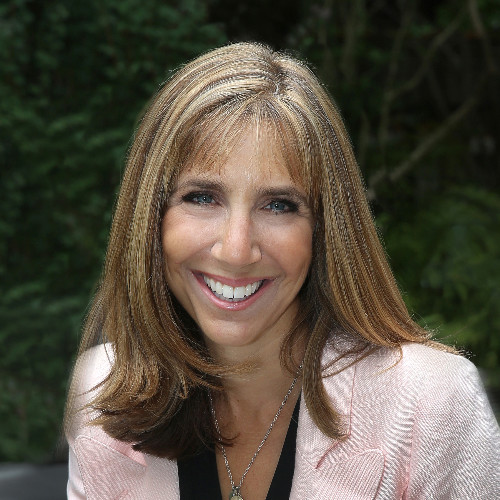Ellen Schwartz, founder of Project Give Back. (photo from LinkedIn)
Jewish Federation of Greater Vancouver’s Choices, the largest celebration of women’s philanthropy in the community, takes place Nov. 3 at Congregation Beth Israel. At the event, featured speaker Ellen Schwartz, founder of Project Give Back, will talk about raising a son with a neurodegenerative disease and how her son Jacob helped her “live a more grounded, purposeful and present life.”
Project Give Back is targeted to elementary students in Ontario. Established in 2007 by Schwartz, a Toronto-based teacher, community advocate and mother of three children, it started as a program she created for her fourth grade classroom and it is designed to teach compassion and concern for community. The program, which selects and trains teachers to deliver its specialized curriculum, runs weekly from October to May in partner schools. In it, students help do the teaching by explaining the value of a worthy cause to their fellow classmates. Since its inception, Project Give Back has helped bring awareness to hundreds of charities.
“The beauty about Project Give Back is children teach us about what matters to them, through their involvement with a charity that they or their family are connected to,” Schwartz told the Independent.
Fifteen years after starting the program, Schwartz said many early participants continue to be actively involved in charitable work as they enter into young adulthood.
“We definitely have seen many of our alumni actively giving and making change in their communities,” she said. “Some of our graduates have published books, with proceeds donated to their chosen and personal causes.”
Some of the many grassroots charities to which Project Give Back has recently brought attention are Sending Sunshine, a program directed at curbing loneliness in the elderly population; Nanny Angel Network, which provides free in-home child care in Canada; and the Super Sophia Project, a group whose goal is to offer hope to children and their families battling cancer.
As Project Give Back bases much of its lessons on personal connection and in-class discussions, it, like many organizations, was affected by the pandemic and had to shift its operations accordingly.
“We had to pivot quickly to online learning. All of a sudden, we looked at the windows of the students and we had family members attending lessons as well as pets, grandparents, etc. That was beautiful to see,” Schwartz recalled.
“Unfortunately, there was a tremendous gap in education and, while many schools were able to continue, almost at the switch of a button, others truly struggled. In these schools, often school was a safe place for many children and many didn’t have the opportunity to reset online quickly. We launched Project Give Back Connects during this time. This was a way to connect powerful messages and resources to classroom teachers, which they could access and share with their students.”
For her Vancouver presentation, Schwartz plans to discuss some of the life lessons she learned from her son Jacob, who died in 2019 at the age of 21. Only months after he was born, he was diagnosed with Canavan disease, which damages the brain’s nerve cells. Jacob wasn’t able to walk, talk or see.
“I will share the best piece of advice I was ever given. It was on a folded note left in my mailbox 25 years ago, [and] I still don’t know who left it there,” said Schwartz. “I will touch on tricks and tips to living a life filled with purpose and meaning as well as shaping grief in a manner that allows us to move forward.”
Currently, Project Give Back only operates in Ontario, but Schwartz is eager to investigate operating in Vancouver schools.
“Our plan is to continue to grow slowly and carefully, never compromising on the quality of our program,” she said. “Sometimes, bigger does not mean better. I would rather teach less children and do it well so that spark becomes a flame, rather than teaching more and hoping to ignite a spark.”
Schwartz also co-founded Jacob’s Ladder, Canadian Foundation for the Control of Neurodegenerative Diseases, with her husband Jeff in 1998. In its 21 years of operation, Jacob’s Ladder raised more than $3 million for research, education and awareness of neurodegenerative illnesses, as well as research into treatments.
Ellen Schwartz has written two books: Lessons from Jacob: A Disabled Son Teaches His Mother About Courage, Hope and the Joy of Living Life to the Fullest and Without One Word Spoken. She has been honoured by the Israel Cancer Research Fund, Ve’ahavta, Aish Toronto, Sick Kids Hospital, and Brilliant Minded Women. And she has been awarded a Queen’s Jubilee Medal, a Meritorious Service Decoration by the Governor General of Canada and a Canada 150 Exemplary Canadian Medal.
“I am hoping to make some new friends and inspire your community with a story I am honoured to be able to share,” Schwartz said, when asked about what she expects from her visit.
The community speakers participating in Choices this year are the daughters of Holocaust survivor Robert Krell: Shoshana Lewis, Simone Kallner and Michaela Singerman. They will share how they honour their father’s experience.
Also part of the Nov. 3, 5 p.m., event will be a marketplace including several local vendors.
Tickets for Choices are $60 and include dinner. However, there is a minimum donation of $154 to support the Federation annual campaign and, for first-time Choices attendees, a minimum donation of $36. Register at jewishvancouver.com/choices.
Sam Margolis has written for the Globe and Mail, the National Post, UPI and MSNBC.

